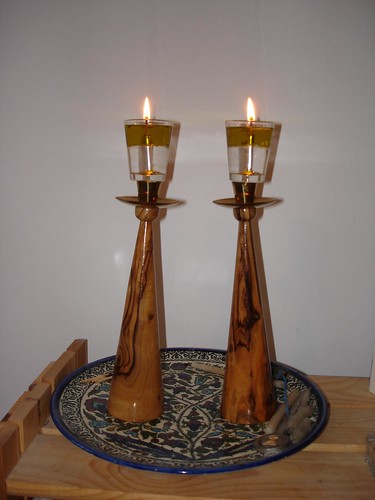Most residents of North American and Europe are currently taking deep metaphorical breaths as they prepare to plunge headlong into “the holidays”. It’s a time of food, decorations, gifts, family, travel, maybe church.Expectations and stress levels are headed sky-high, and levels of depression increase as well.
For those of us who take Judaism seriously, that period has just ended. Coming up tonight and continuing through Saturday night we will finally have what my grandfather used to call a “wochedikke Shabbos” – an everyday Shabbat. That is of course a contradiction in terms, as Shabbat is by definition different from the days of the week, but everyone who has rejoiced and slogged in equal measure through the past month can immediately relate. The challah is braided again, and will be sprinkled with salt, not dipped in honey. The Torah scrolls are back in their regular mantles, as opposed to the white ones they have sported since late September. In Israel, even those who are completely uninterested in the religious aspects acknowledge the mythical period of “acharei hachagim” – after the holidays – since during the period of the holidays it is pretty much impossible to have your car repaired or any kind of government document issued. Come back, they will tell you, acharei hachagim and we will see what we can do. Universities don’t even start their semesters until acharei hachagim, although regular schools do start in September (and achieve very little until acharei hachagim – which is also true of the Jewish school my children go to). Now that the holidays are over and the sukkah is put away, we can take a deep breath, square our shoulders and start life again – going back to the gym, starting on serious projects.
Strictly speaking, this Shabbat is not entirely “wochedik”. It is Rosh Hodesh Heshvan, the beginning of the month of Heshvan – a month also known as Mar Heshvan, or Bitter Heshvan, maybe because it doesn’t have any holidays in it (to make up for the overdose in Tishrei, maybe?). There will be special Torah readings and additions to certain prayers. Rosh Hodesh has been traditionally considered a women’s holiday, because of their refusal to take part in the sin of the Golden Calf. But it’s only a semi-holiday, not of the calibre of the ones we have just come through. We can handle this.
For those who think that Hanukkah is the Jewish Christmas, trust me, it’s nowhere in its league in terms of importance and therefore stress. The real Jewish holiday season has just ended.
Wishing all who celebrate a peaceful Shabbat and a blessed month of Heshvan, and to all who are heading into holiday madness, I wish you strength.


Actually my father used the term in years when Erev Rosh Hashana and of course Erev Succot and Erev Shmini Atzeret all preempted the Kiddush. In fact he called it a wochediike kiddush. Your Mom always said that all the learning is school was from acharei hachagim to Pesach with a break at Hannukah.
Another interpretation I saw on FB today was that Marheshvan is simply a corruption of the Babylonian word for eighth month. Now how boring would that be???
They are both valid interpretations of what is almost certainly a Babylonian name having to do with Marduk, LOL. Don’t you love magical thinking??
Wait! I was taught that Mar Heshvan translates as Mr. Heshvan — because it doesn’t have any holidays, it gets an honorific to make it feel better. O suppose Bitter is probably truer, originally.
I think I like it my way better. More whimsical, ya know?
Shabbat Shalom, from one who is letting the bakery do the hallah this week.